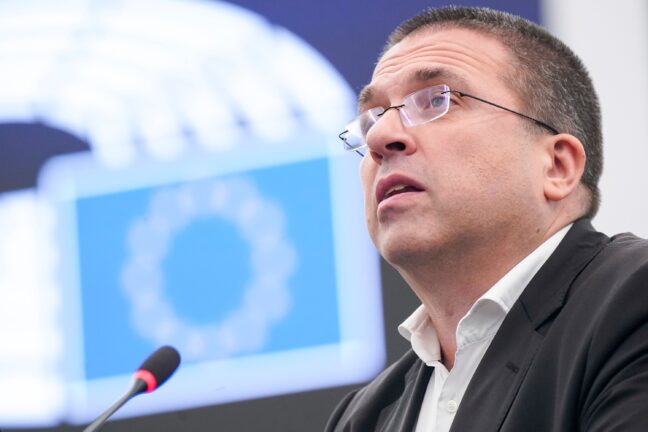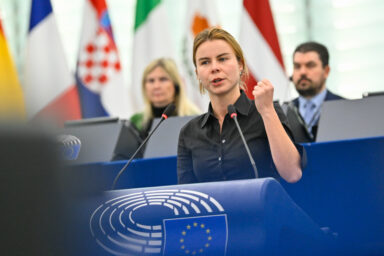Less bureaucratic paperwork and protection on a par with that of energy and defence is what key pharma figures want from the Critical Medicines Act (CMA). The legislation, awaiting a 2 December plenary vote, is to secure Europe’s medicine supply by reinforcing EU manufacturing and cutting red tape.
The proposal seeks to introduce strategic projects to expand EU capacity for medicines and active pharmaceutical ingredients. “These projects are crucial for boosting EU manufacturing capacity and resilience,” rapporteur Tomislav Sokol (EPP/HRV) said, “but strategic must not mean duplication or inefficiency.”
Companies receiving public funding would need to commit to reliable supply: “Any company benefiting from public financial support must meet clear obligations to prioritise supply to the Union market and to respect agreed commitments with penalties for non-compliance,” Mr Sokol claims.
The rapporteur stressed that the CMA’s ambition is to speed up decision-making: “This is why, for instance, we have the category of strategic projects for which there should be less red tape, less bureaucracy. So things and procedures should go smoother, should go faster. So the very idea of this proposal is to reduce bureaucracy, reduce red tape, and make it possible for things to go, to get to the patients, medicines to get to the patients, faster than is the situation now.
You might be interested
Heavy lifting in the chamber
The scale of engagement around the file reflects its political weight. Members of the Parliament’s health committee (SANT) tabled 1,313 amendments, while additional opinions from other committees added 119 amendments in ENVI, 414 in ITRE, and 221 in IMCO. Mr Sokol said on Wednesday this shows “both the importance of this file and the diversity of views across our committee,” adding that it demonstrates a “shared commitment to strengthening Europe’s capacity to ensure safe, accessible and reliable medicines for our citizens.”
We are now working intensively to reach a broadly supported agreement with the aim of holding the vote on 2 December. — MEP Tomislav Sokol
The Croatian Christian democrat said “we are now working intensively to reach a broadly supported agreement with the aim of holding the vote on 2 December.” The committee has already held “five technical meetings, with a sixth scheduled this week, and one shadows meeting with a second planned for next week”.
Referring to his report, Mr Sokol said Europe “must boost its competitiveness and ensure patient safety by reinforcing our pharmaceutical industry and increasing production within the European Union.”
Antibiotic plants as strategic assets
The European Commission has echoed Parliament’s call for acceleration. Agnès Mathieu-Mendes from DG SANTE said the proposal targets companies that “invest in the creation, modernisation and expansion of manufacturing capacity for critical medicine in the EU,” noting that such projects should “benefit from fast-track procedures and support and avoid unnecessary bureaucracy.”
In Austria, Sandoz operate Europe’s last remaining fully vertically integrated production site for penicillins. It’s something we are proud of; but it must be treated as strategic infrastructure, like energy or defense. — Rebecca Guntern, President Europe at Sandoz
For the industry, that focus on manufacturing speed and resilience is essential. Rebecca Guntern, President Europe at Sandoz, wrote on LinkedIn Europe must also protect its existing capacity for antibiotics: “In Austria, Sandoz operate Europe’s last remaining fully vertically integrated production site for penicillins. It’s something we are proud of – but it must be treated as strategic infrastructure, like energy or defense.”
Other arguments ensued. “To be truly effective, the Critical Medicines Act must go beyond reshoring ambitions and focus on preserving and modernizing existing manufacturing infrastructure. We need to ensure that what is produced in Europe can be sold in Europe,” Ms Guntern wrote.
The Alpbach Communiqué
The company’s Kundl site in Tyrol, upgraded under a €200m modernisation programme co-funded by Austrian state aid, is the largest and only fully integrated penicillin production network in Europe. It now produces up to 240 million packages per year, covering roughly one in two boxes of penicillin used across the continent.
In September, Sandoz joined stakeholders in adopting the Alpbach Communiqué at the European Forum Alpbach and now submitted to EU member states and the Health Emergency Preparedness and Response Authority (HERA).
The communiqué supports “forthcoming EU legislation aimed at creating favourable conditions for antibiotic Active Pharmaceutical Ingredients manufactured within Europe” and seeks to “restore and safeguard European sovereignty in antibiotic manufacturing”. It warns that more than 80 percent of global antibiotic API supply comes from China, a dependency that “poses serious risks to public health, supply-chain resilience, competitiveness and geopolitical stability”.
Momentum before year-end
The initiative reflects the same urgency Parliament is now debating, to treat pharmaceutical production as strategic infrastructure and anchor it in Europe’s industrial base.
With the December vote approaching, the CMA debate has shifted from diagnosing shortages to implementing a coordinated industrial response. If adopted, the Parliament’s position will set the tone for negotiations with the Council and the Commission, and signal that Europe is ready to treat medicine manufacturing with the same priority as energy or defence.











